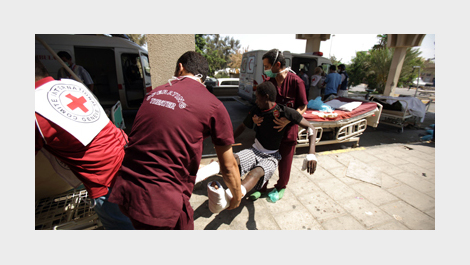

Navigation path

The European Commission has deployed a multi-sectoral team of humanitarian experts to Tripoli, and has opened a humanitarian office in the Libyan capital. The experts are ensuring that the assistance provided by the European Union in health, medicine, food and drinking water is delivered expeditiously, and that new needs are identified and addressed immediately. They are working closely with humanitarian partners present in the city.
Commissioner Kristalina Georgieva said: "My major concern now is for the civilians in Tripoli. Our field experts are assessing the humanitarian situation and the fast-evolving needs in Libya's most populated city. In their initial findings the experts point out the shortage of emergency healthcare provision and the disruptions of drinking water supply. We are working with our humanitarian partners who are doing a tremendous job in a very difficult context. We have allocated €10 million to support their emergency humanitarian operations. We are fully committed to ensure that the basic and most urgent needs of the population are met as swiftly as possible.
"Safeguarding the safety of civilians is of utmost importance and a point of major concern in this volatile moment. I implore all sides to abstain from reprisals and to fully respect International Humanitarian Law," the Commissioner underlined.
The humanitarian funding which the Commission had set aside for Tripoli is being channelled to the needy citizens of Libya through those partners present in the field. Of the €10 million set aside for Tripoli and the neighbourhood, €4 million has just been earmarked to support the activities of the International Committee of the Red Cross in the Libyan capital, and in other cities where the conflict continues to rage. The funding will contribute to medical care, protection, water and sanitation, and the distribution of non-food items.